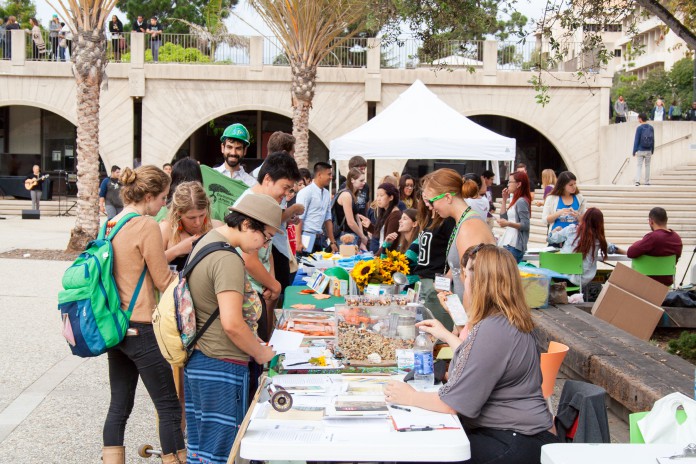Madison Mead
Photos by Kelly Xin and Leah Armer, Staff Photographers
Stigma Free at UCSB brought members of University of California, Santa Barbara and the surrounding community together to share information about mental health and the issues of stigma on Nov. 13. The fair was organized by Active Minds, Associated Students, and the Commission on Student Well Being to spread awareness and unite the community.
The event was held in Storke Plaza from 12 PM-5 PM, where students to stop in, explore, and participate throughout the day. From 12 PM-2 PM, various student and community organizations, pertaining to many aspects of well-being, set up booths where people could stop by, talk to the members, and learn about what they do. The fair offered food and music as students talked to people a learned more about mental health. From 2 PM-5 PM, the event consisted of a video presentation of a TED talk on stigma, speeches and discussion with a panel of students and professionals, and a relaxing meditation session.
“This event starts a conversation that needs to be started,” said Julie Keller, a third-year biopsychology major who spoke about her personal experiences with mental illness on the panel. “We are in this transition phase between accepting mental health issues and integrating the best practices. It’s important to collaborate with the community, students, and school members and professionals in order to find what will best work for us.”
The fair started this conversation with students, professionals, staff, and other members of the community by talking about stigma and bringing it into the open. The personal stories people shared began with a TED talk by Kevin Breel, who shared his own experience with depression and the stigma surrounding it in a video presentation.
Breel prompted attendees with a scenario. “Ask yourself this, would you rather make your next Facebook status that you’re having a tough time getting out of bed because you hurt your back or you’re having a tough time getting out of bed every morning because you’re depressed?” Breel continued, saying “That’s the stigma… We are so accepting of any body part breaking down other than our brains.”
The personal stories showed how damaging stigma can be to an already struggling person. On the panel, Keller speaks about her experience and said, “I was terrified of what my friends, family, classmates, and anyone else would see if I took off the mask that said I had my life together, and instead tell them that I was struggling, that I didn’t know what was wrong with me, or why. I anticipated the reflection, the stigma, and worst of all I believed it.”
Those in the audience had the opportunity to gain new perspective through these stories.
“A girl on the panel was in one of my classes freshman year and I haven’t seen her since then,” said Rachel Joyce, a third-year communications major. “Then she shows up on the panel and I was really surprised. I had no idea she had been struggling with that and it just made me really realize, everybody you see walking around is dealing with something, and you have no way of knowing.”
The discussion and panel stressed how mental health issues are common, and so is the stigma that surrounds it. Heidi Zetzer, a director at Hosford Counseling and Psychological Services in Santa Barbara and a speaker on the panel, stressed that people who struggle with mental health issues are not a separate group to label and fear, and they are not people whose entire identity surrounds their illness; they are us. They are afraid of being ostracized, and they hide what they are going through. Zetzer explained that this point is what makes these events so important and relevant to students.
“This event is crucial because stigma is the number one reason why students who could benefit from counseling do not seek services,” said Zetzer. “And so the opportunity they provide the campus and the community for people to share their stories shows how mental health issues affect everyone. Sharing personal narratives puts a face on mental illness and helps us understand and support each other.”











